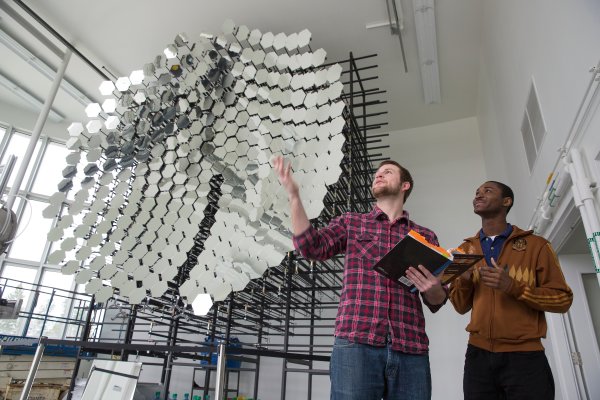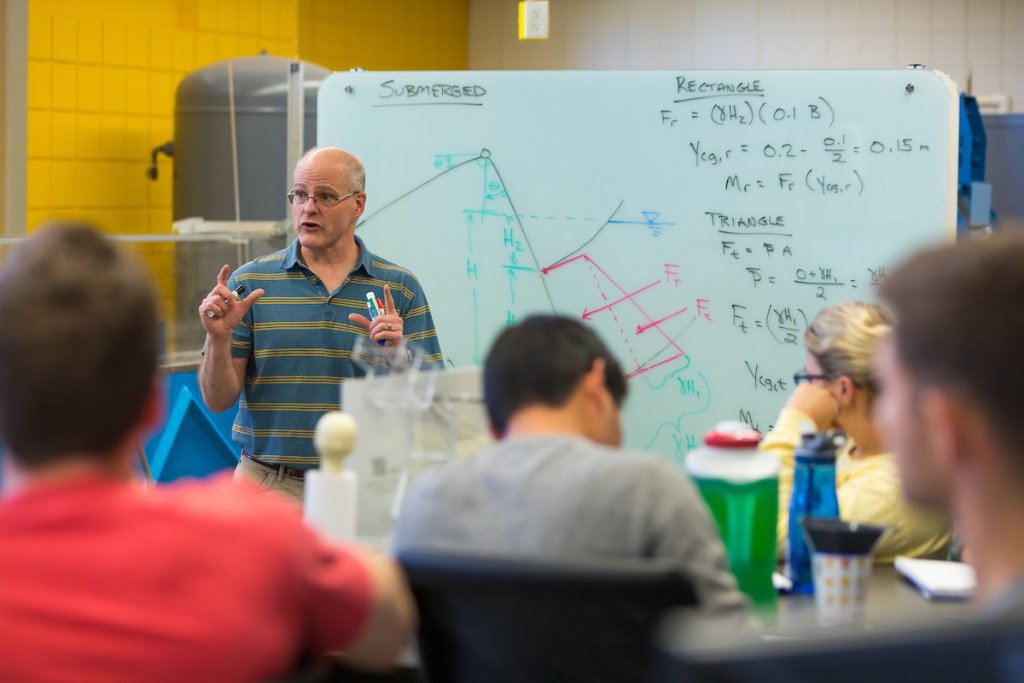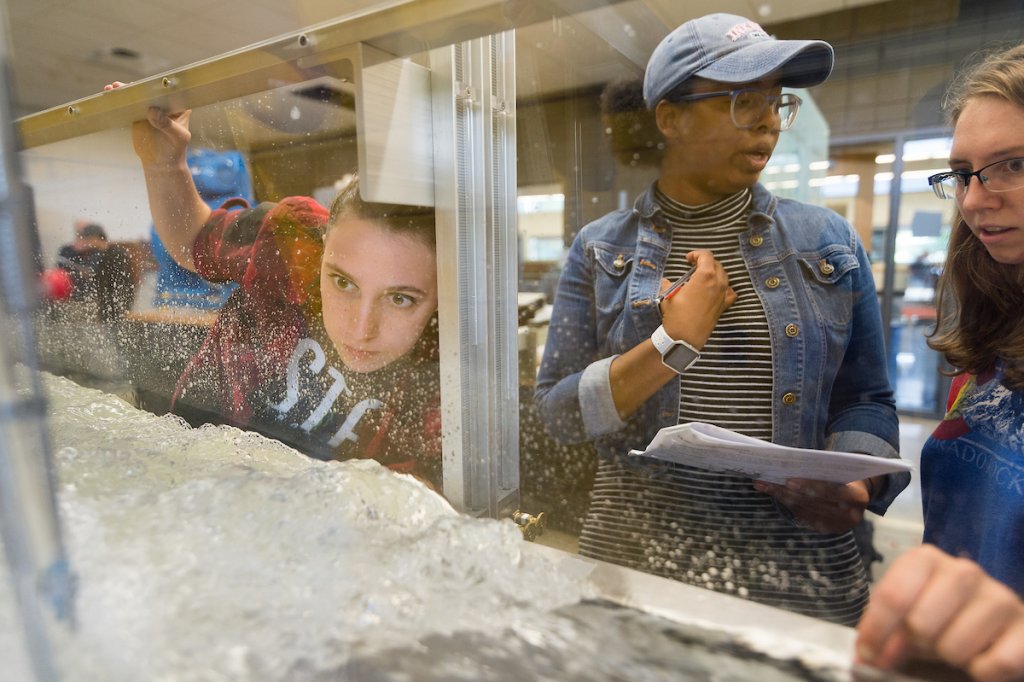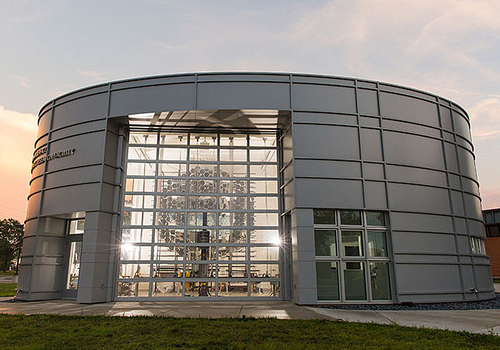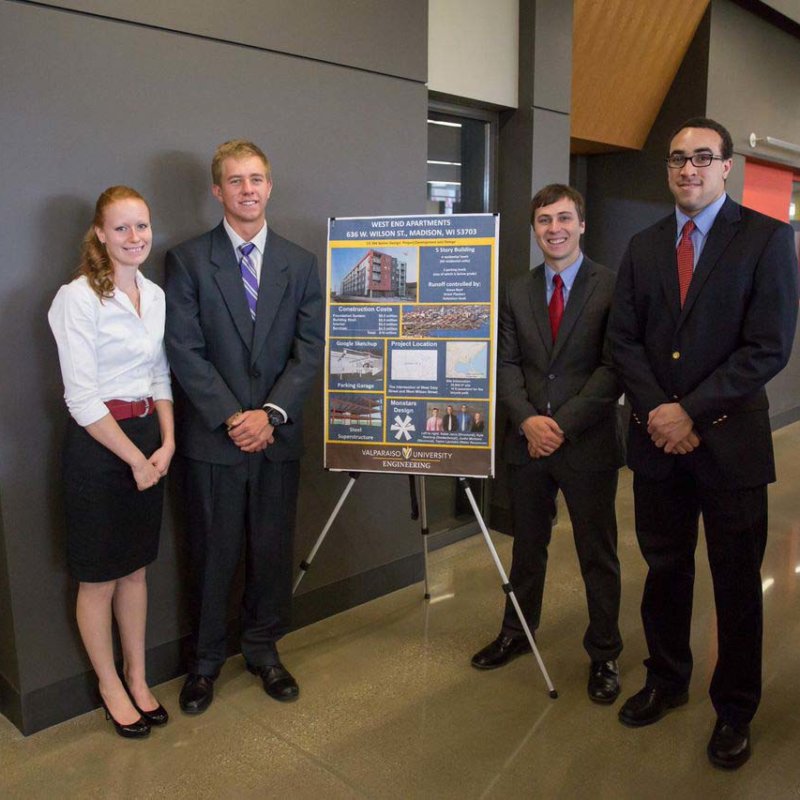Civil Engineering
Pursue a comprehensive education and earn a bachelor’s degree in civil engineering that provides major design experiences in environmental, geotechnical, structures, transportation, and water resources engineering.
Our rigorous civil engineering education and extracurricular projects will develop the professional skills needed to solve global challenges, such as increasing access to clean water and designing safer structures. As a student in the College of Engineering, you’ll develop the teamwork and communication skills needed to lead sustainable development initiatives that protect our environment and improve the quality of life of people.
Students in Valpo’s college for civil engineering benefit from the many advantages our College of Engineering has to offer, including:
- Accreditation by the Engineering Accreditation Commission of ABET
- An exclusive undergraduate program featuring small class sizes
- Comprehensive multi-disciplinary design projects and small laboratory groups that foster teamwork
- Extensive computational and laboratory facilities
- Opportunities for participation in funded undergraduate research programs including summer research
- Cooperative education and internship programs with employment opportunities throughout the U.S.
- A comprehensive program covering five areas of study including environmental, geotechnical, structural, transportation, and water resources with the flexibility to pursue minors such as business administration and humanitarian engineering
With an employment rate of 97% within the first six months of graduation, Valpo graduates can be found in a variety of careers, including:
- City planner/city engineer
- Structural engineer
- Traffic or transportation engineer
- Water resources engineer or manager
- Environmental engineer
- Geotechnical engineer
- Consulting civil engineer
- Contracting civil engineer
- Site Engineer
- Building control surveyor
- Patent attorney
- Project engineer
- Professor
- Teacher
- Construction manager
- Researcher
- Municipal engineer
- Engineering technician
- Materials and test engineer
- Supervisor
- Forensic engineer
- Sustainability
- Researcher
SEMESTER 1 |
|
| GE 100 Fundamentals of Engineering | 2 Cr. |
| GE 100L Engineering Lab | 0 Cr. |
| CORE 110 The Human Experience | 4 Cr. |
| MATH 131 Analytic Geom. & Calc. I | 4 Cr. |
| PHYS 141 Newtonian Mechanics | 3 Cr. |
| PHYS 141L Experimental Physics I | 1 Cr. |
SEMESTER 2 |
|
| CE 151 Introduction to Computer-Aided Drafting | 1 Cr. |
| GE 109 Mechanics-Statics | 3 Cr. |
| CORE 115 The Human Experience | 4 Cr. |
| MATH 132 Analytic Geom. & Calc. II | 4 Cr. |
| KIN 101 Stress & Wellness | 1 Cr. |
| Humanities, Soc. Sci, Theo Elective | 3 Cr. |
SEMESTER 3 |
|
| STAT 240 Statistical Analysis | 3 Cr. |
| CE 215 Mechanics of Material | 3 Cr. |
| CHEM 115 Essentials of Chemistry | 4 Cr. |
| MATH 253 Calculus III | 4 Cr. |
| World Language/Diversity Elective | 3 Cr. |
SEMESTER 4 |
|
| CE 212 Materials Engineering | 3 Cr. |
| CE 213 Tech. & Prof. Writing in Civil Engr. | 1 Cr. |
| CE 216 Intro to Structural Engr. | 3 Cr. |
| CE 252 Intro. to Transportation Engr. | 3 Cr. |
| CHEM 116 Applic. of Chem. in Engr. | 4 Cr. |
| MATH 260 Linear Systems and Matrices | 1 Cr. |
| MATH 270 Ordinary Differential Equations | 3 Cr. |
SEMESTER 5 |
|
| CE 317 Des. of Concrete Structures | 3 Cr. |
| CE 320 Soil Mechanics | 4 Cr. |
| CE 334 Fluid Mechanics | 4 Cr. |
| CE 364 Environmental Engr. I | 4 Cr. |
SEMESTER 6 |
|
| CE 318 Design of Steel Structures | 3 Cr. |
| CE 322 Soil & Foundation Engr. | 3 Cr. |
| CE 335 Hydrology | 3 Cr. |
| CE 354 Des. of Transportation Facilities | 3 Cr. |
| CE 365 Environmental Engr. II | 3 Cr. |
| GE 311 Financial Decisions in Engineering | 1.5 Cr. |
| GE 312 Ethical Decisions in Engineering | 1.5 Cr. |
SEMESTER 7 |
|
| CE 493 Sr. Design I: Project and Planning Mgt. | 3 Cr. |
| THEO 200 The Christian Tradition | 3 Cr. |
| Civil Engineering Elective | 3 Cr. |
| Civil Engineering Elective | 3 Cr. |
| Professional Elective | 3 Cr. |
SEMESTER 8 |
|
| CE 494 Sr. Design II: Project Dev. & Design | 3 Cr. |
| Civil Engineering Elective | 3 Cr. |
| Technical Elective | 3 Cr. |
| Science Elective | 3 Cr. |
| Humanities, Soc. Sci., Theo Elective | 3 Cr. |
| Total credits required for graduation = | 128 Credits |
Electives
Writing Intensive Course (as indicated by a superscript “w”): At least one course taken to satisfy the World Languages/Diversity Elective, Humanities, Social Science, and Theology Electives, THEO 200: The Christian Tradition, or CE 213 must be a Writing Intensive Course. List of approved Writing Intensive Courses
Professional Electives: The professional elective requirement may be met by taking a course from an approved list of courses. Other choices may be made available by petition to the Civil and Environmental Engineering Department. List of approved Professional Electives
Civil Engineering Electives: These nine credits are to be selected from the array of civil engineering electives provided. Courses which fulfill civil engineering elective requirements are indicated with a superscript “c”: (…)c. List of approved Professional Electives
Cooperative Education: Students may request to substitute up to six credits of GE 481 through GE 483 for the Professional and Technical Elective. All courses are graded S/U only.
Technical Elective: The Technical Elective may be met by taking a course from an approved list of courses. All courses are graded S/U only.
Science Elective: The Science Elective requirement is met by taking a course from the approved list of courses. List of approved Science Electives
World Language/Diversity Electives: Students will take three credits from either world language courses at the 102 level or above or from the diversity list. List of approved World Language/Diversity Electives
Humanities, Social Science, Theology Electives: Students may take six credits from the approved list of Humanities courses, Social Science courses, or Theology courses. Courses may be from the same area or from different areas. List of approved Humanities, Social Science, Theology Electives
Computer Specifications: When looking for a computer to use for engineering classes, click here for the specifications.
The Civil Engineering program is accredited by the Engineering Accreditation Commission of ABET, www.abet.org
Educational Objectives
Program Educational Objectives are broad statements that describe what graduates are expected to attain within a few years of graduation. They are based on the needs of the program’s constituencies. The Program Educational Objectives help to direct and measure the success of the civil engineering program in accomplishing its mission. Review of the Program Educational Objectives is an integral part of the annual assessment process.
Within a few years of graduation, civil engineering alumni will be expected to have:
- A position within the civil engineering community through which they are able to make a positive contribution to the engineering profession and society as a whole
- Participated in continuing education activities, such as courses taken for advanced degrees, seminars, workshops, and conferences, demonstrating their commitment to life-long learning
- Advanced in their profession. Advancement may be demonstrated through achievements such as promotions and licensure.
Student Outcomes
Student Outcomes describe what students are expected to know and be able to do by the time of graduation. These relate to the skills, knowledge, and behaviors that students acquire as they progress through the program. The Student Outcomes help to direct and measure the success of the civil engineering program in accomplishing its mission. Review of the Student Outcomes is an integral part of the annual assessment process.
The civil and environmental engineering department will demonstrate that graduates from the civil engineering program at Valparaiso University have attained the following outcomes:
- An ability to identify, formulate, and solve complex engineering problems by applying principles of engineering, science, and mathematics
- An ability to apply engineering design to produce solutions that meet specified needs with consideration of public health, safety, and welfare, as well as global, cultural, social, environmental, and economic factors
- An ability to communicate effectively with a range of audiences
- An ability to recognize ethical and professional responsibilities in engineering situations and make informed judgments, which must consider the impact of engineering solutions in global, economic, environmental, and societal contexts
- An ability to function effectively on a team whose members together provide leadership, create a collaborative and inclusive environment, establish goals, plan tasks, and meet objectives
- An ability to develop and conduct appropriate experimentation, analyze and interpret data, and use engineering judgment to draw conclusions
- An ability to acquire and apply new knowledge as needed, using appropriate learning strategies.
Enrollment and Graduation Data
The College of Engineering tracks its enrollment and graduation data, click the link below to view our data over the past five years.
